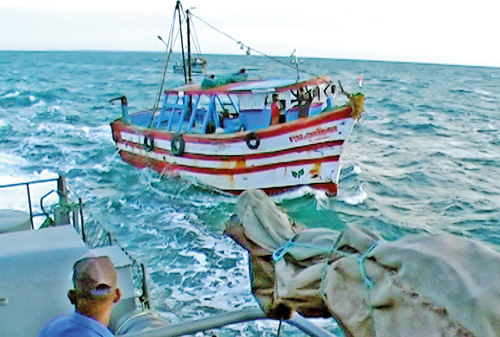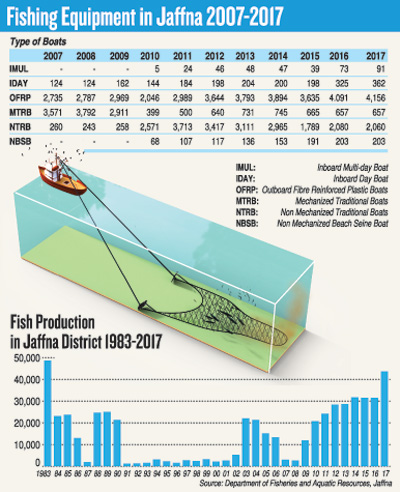News
Destructive local trawlers vacuuming the livelihoods of fisherfolk

Indian trawler being intercepted by the Navy in the northern seas
After Sri Lanka began taking a tough line on destructive Indian bottom trawlers in Sri Lankan waters, small-scale fishermen in the north are up in arms against local trawler owners.
According to groups of fishermen, some 600 mechanised trawlers are operated by local fishermen from Gurunagar, Point Pedro, the northern islands of Jaffna peninsula and Pallimunai, Pesalai of Mannar.
These fishing folk accuse local trawler operators of threatening their livelihood by operating near coastal areas, which had been their traditional fishing grounds for decades.
Jaffna District Fishermen’s Association Secrtary Annalingam Annarasa told the Sunday Times that three days a week, namely, Tuesday, Thursday and Sunday, are allocated for local trawlers, whereas small-scale traditional fishermen can operate on other days.
“By the time we go fishing, the trawlers have wiped out the whole catch,” he said.
Following the end of the war in 2009, permits were issued arbitrarily for trawling in the north under political influence considering the vote base of the fisherfolk in coastal areas. With Indian fishermen engaging in harmful bottom trawling — designated as one of the Illegal, unreported, and unregulated (IUU) fishing methods — across the Palk Bay, local trawlers also engaged in a similar practice claiming that it could be the only effective fishing method for shrimp and prawn in the sea and muddy waters respectively. Even though local trawler operators agreed to go fishing five kilometres from coastal land, they repeatedly violated it, causing a shortage of catch in addition to damaging fishing equipment.
“One year has passed since the law prohibiting trawling in Sri Lanka. However, it is yet to be implemented. Our fishing nets and equipment were damaged in the past when trawlers engaged in fishing near coastal areas. Since we were not given any compensation, we had to mortgage our properties and jewellery to purchase new vessels,” said fisherfolk leader Annarasa. He believes this may be one reason many fishing families in northern islands got deep into debt with micro credit loans.
Unlike the Indian bottom trawlers, massive vessels fitted with high horse power engines, which plough the sea bed for a good catch, local trawlers in north are modified multi-day boats with extra horsepower and fishing equipment. Local trawler operators claim that their activity is significantly “less impactful on marine resources”, compared with Indian bottom trawlers which would wipe out the whole sea bed along with marine resources, corals and fish stock banks. However small-scale fishermen have observed a drastic decrease of their fish catch because of trawling for years in the northern seas.
Meanwhile, the Fisheries Department, which is the permit issuing arm of the Fisheries Ministry, is planning to amend the law to legalise trawling and demarcate fishing grounds. The ministry has also commissioned another arm, the National Aquatic Resources Research and Development Agency (NARA), to submit a report on suitable fishing grounds.
H.P. Kalyani Hewapathirana, director of fishing operations at the department, told the Sunday Times that banning trawling is not possible considering those who fish for shrimp for export.
“Our department is planning to amend the law to legalise this practice, while ensuring minimum impact on marine resources,” she said.
Stressing that the impact of local trawling on marine resources is much less harmful compared to Indian bottom trawling, the chief of fishing operations indicated that is why NARA and the Navy are trying to identify suitable fishing grounds, while protecting small-scale fishing.
NARA’s Marine Biological Resources Division Chief Dr. H.S.S.K. Haputhanthri, who is overseeing the research on trawling, believes that with proper restrictions such as a breeding ban, tough regulations on fish stock management, trawling can be legalized in Sri Lankan waters in designated waters particularly for shrimp.
“We are trying to identify potential sustainable fishing grounds in Pesalai, Mannar, Negombo and Kalpitiya in the Western coast and Palk Bay region near northern islands to ensure an adequate harvest of fish and shrimp. However, it is up to the ministry to decide finally to issue fishing permits,” he said, while stressing that trawling is still in use in other countries. Unions of small-scale fishermen in the Northern Province demanded that their livelihood be protected, while expressing doubts over the practicality of introducing such fishing grounds and tough regulations. They pointed out that even though it was agreed by local trawlers in the past to engage in fishing five kilometres from shore, no one complies.


